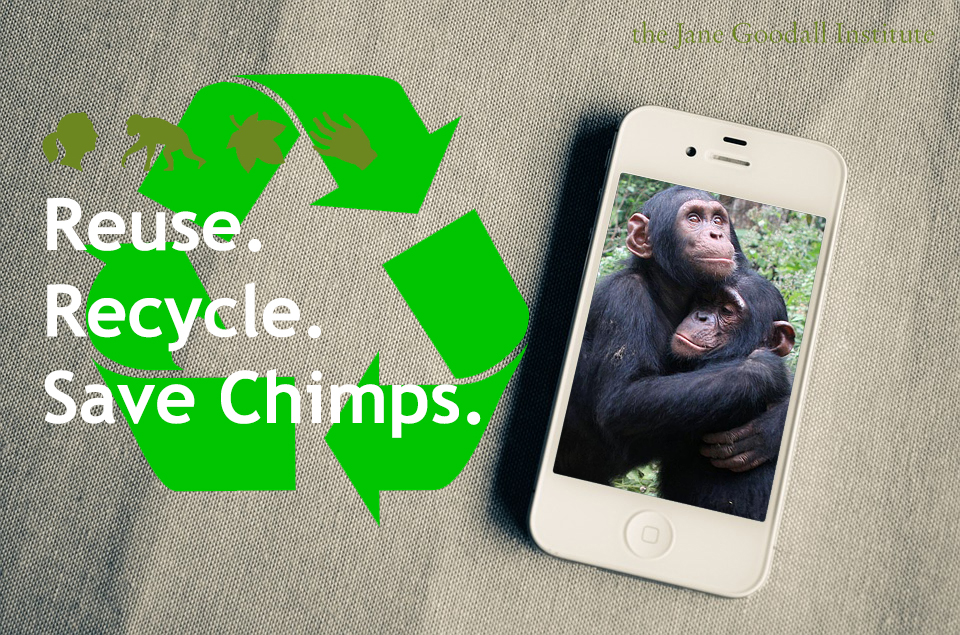Have you ever wondered what your phone was made of or how those materials were collected? Well, turns out there’s a lot more to that story than you may have thought. On January 24, 2017, the Jane Goodall Institute will hold a Call to Action, dedicated to the international recycling of mobile phones. Why set aside a day for recycling mobile phones, you might ask? Or, more importantly, why do we need to recycle mobile phones?
In 2014, Time magazine released an article focusing on the significance of where the materials for our technology originate. If you’re thinking about the manufacturing of consumer technology, like the phone or computer you’re reading this on, you’re most likely picturing an enormous factory overseas. These factories make your tech with materials like gold, tin, tungsten and tantalum (coltan). But where do those factories get their materials?

According to the article, most of the materials are first bought from the Democratic Republic of Congo. It’s here, in the DRC, that problems regarding conservation and human rights begin to emerge. The materials specifically bought for giant retailers contain these conflict materials which are detrimental for all living species inhabiting the country/countries from which they originate. These materials are commonly called ‘conflict materials’ because they are taken from an area of typically low socioeconomic status, whose profits contribute to an increase in violent conflicts and a perpetuation of environmental destruction.
The human and environmental cost of the extraction of these materials is staggering. The largest group of intact populations of chimpanzees is located in the Congo Basin. Because big retail chains use conflict materials to produce the technology we use today, it is necessary for materials such as gold, tin, tungsten and tantalum to be extracted from such areas. This is a serious problem because to find the materials trees must be cut down, creating clearings to find these resources. The removal of forest for this purpose fragments the forest (breaking it up into smaller forest “patches”) which destroys the chimpanzees’ range habitat and jeopardizes the health of their communities. Because chimps are key seed dispersers, their well-being affects the well-being of essentially all of the other living things in that ecosystem and connecting ecosystems. Losing them would have devastating consequences, beyond just the tragedy of the end of their populations in the wild. In addition to damaging environmental factors, conflict materials have also been cited as the driving force for the continuing war in the Democratic Republic of Congo. According to Slate, referencing the The Dodd-Frank Act which forces corporations to present disclosures around conflict minerals used in their products,
“the exploitation and trade of conflict minerals originating in the Democratic Republic of the Congo is helping to finance conflict characterized by extreme levels of violence in the eastern Democratic Republic of the Congo, particularly sexual- and gender-based violence, and contributing to an emergency humanitarian situation therein.”
Although it may come as a shock, the cost of a cell phone is much more than any of us bargained for. The production of these devices creates unspeakable horrors and violence, and disrupts and even destroys entire habitats. However, with your help, we will be able to reduce the negative effects of these materials.
What Can I Do?
On January 24th, the Jane Goodall Institute offices around the world will participate in a global Call to Action in hopes of erasing some of the damage that has already been done and preventing future harm. Mobile Recycling Day, now in its third year, is something that should be just as recognized as any other holiday, as it is certainly an urgent cause. 440 people have already signed up to recycle their electronics and we’re hoping to double that number this year. On the 24th, and for the entire month of January, join us in recycling old and used mobile phones and other technology to help raise awareness to the already increasing prevalence of conflict minerals. Please encourage all your friends, family, and loved ones on this day to help protect the chimpanzees, their habitat, and all those living in the Congo basin.
1) Sign up and share : www.mobilerecyclingday.org
2) Sharing is caring
- Turn up the volume – Share with Thunderclap: http://thndr.me/xYvg7b
- Spread the word! Share about this campaign on social media gearing up for Mobile Recycling Day and beyond. Click to tweet: http://ctt.ec/fJaiX use tags: #AnswertheCall #RecyclingforGood



